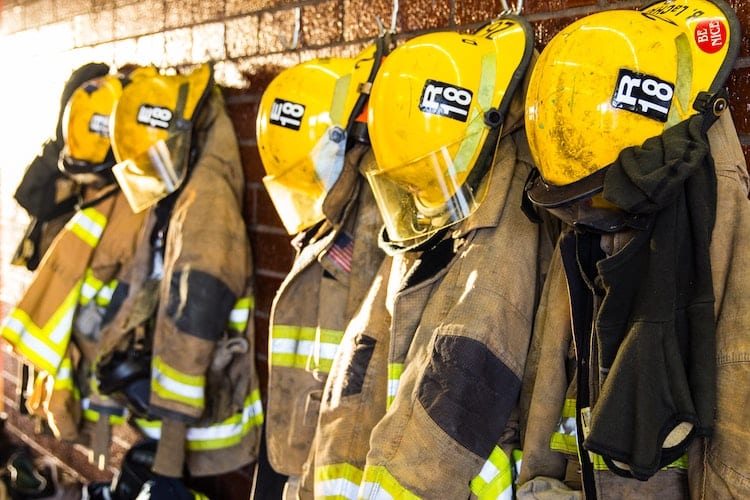California Allows Former Inmates to Become Firefighters

This year’s wildfires in California have produced countless jaw-dropping images. The skies have been turned red, orange, or black with smoke, and the devastation is hard to comprehend. Since the 1940s until just this June, California – a state often impacted by wildfires – often pulls its firefighters from unusual places. Although the coronavirus outbreak stalled the program this summer, California has 192 state inmate fire crews – prison labor programs that task inmates with battling blazes for almost no pay.
Nearly 4,000 California inmates work as firefighters while imprisoned across 44 “Conservation Camps” run by the California Department of Corrections and Rehabilitation. These prisoners save homes and people from wildfires every year, but are paid a few dollars daily and are largely ineligible to become firefighters after leaving prison.
Civil rights groups have criticized the practice for years, for a number of reasons, and prison fire crews just won a major victory for the first time since their creation. In early September, the California State Legislature ruled that non-violent offenders who worked on fire camps able to clear their records and join a fire department after release. The move impacts not only the long history of prison labor in the country but the future as well.
California’s Prison Labor Conservation Crews
One of the better-known quirks of U.S. law is that forced labor is not technically illegal in certain situations. The 13th Amendment banned slavery in the country, “except as a punishment for crime whereof the party shall have been duly convicted.” In short, prisoners can be forced into involuntary work.
While many people are aware of this, few associate prison labor with fire fighting. Setting aside the larger ethical question of forced labor for prisoners, how is it possible that these prisoners can be forced into such an important, intense, and lethal job? The first California fire crew was deployed during World War II while most able-bodied people were in the military. Amid the war, 41 temporary camps were established with prisoners aiding the fire brigade. The first permanent camp was established in 1946, and the program has grown since then. Roughly a fifth of the California fire force is prisoners.
Despite the importance of their job, inmate firefighters earn between $2.90 and $5.12 per day, CDCR spokeswoman Alexandra Powell told KQED. When sent into active emergency situations, inmates stand to earn an extra $1 per hour.
Only certain inmates are eligible for the fire camps. Those with violent or sexual offenses or a history of arson are automatically banned, for instance. When not fighting fires, the crews work to maintain parks, forest and handle other conservation projects.
One of the most shocking aspects of the program is that these prisoners aren’t even able to become firefighters after leaving because of their criminal record. Most California firefighters are required to be emergency medical technicians. However, licensing boards can deny EMT certification to anyone because of a criminal record.
California Bill AB 2147
Proposed in February and passed in September, this bill allows inmate firefighters to potentially join the fire department after their release. Technically speaking, the bill creates a system in which former prison firefighters can expunge their records. Under prior CA law, a past conviction would make serving as an EMT or firefighter nearly impossible. Now, former fire crew workers have a chance to continue working on the outside.
#AB2147 heads to the Governor. If we really want to bring about change and lower our recidivism rates, we have to ensure that those that have served their sentences have an opportunity for meaningful employment. Those that have served on the fire lines deserve a second chance. pic.twitter.com/det6dqpgg0
— Assemblymember Eloise Reyes (@AsmReyes47) August 31, 2020
Moving Forward
This bill is obviously a massive win for previously and soon-to-be-released Californians who worked on conservation camps. Finding work, any work at all, after a prison sentence can be incredibly difficult in this country, even for non-violent, non-repeat offenders.
If the true goal of the prison system is to rehabilitate inmates, then this California bill is a no-brainer. In this example, inmates receive enough firefighting training to serve after prison but were barred from doing so. California righted an obvious wrong and gave some ex-prisoners a much clearer path to re-entering the world. Hopefully, other states follow suit.
Prison labor in American on the whole remains a controversial subject. Many prisoners, particularly incarcerated minorities, are locked up for petty crimes. Forced labor, particularly life-threatening work, feels unfair and grotesque. Some authors and activists have even drawn comparisons between penal labor and slavery in the U.S. Serious questions remain about how inmates are treated, and how ex-convicts face massive hardship upon their release.
For now, this bill is a step in the right direction. It comes at a time when wildfires have burned a million more acres than the average year, and inmates are increasingly used on the front lines of the blazes. Allowing those men and women to serve after incarceration is a small token of gratitude for risking their lives to protect our wildlife and homes.
See Also: Bill of Rights for Student Borrowers Gains National Attention









